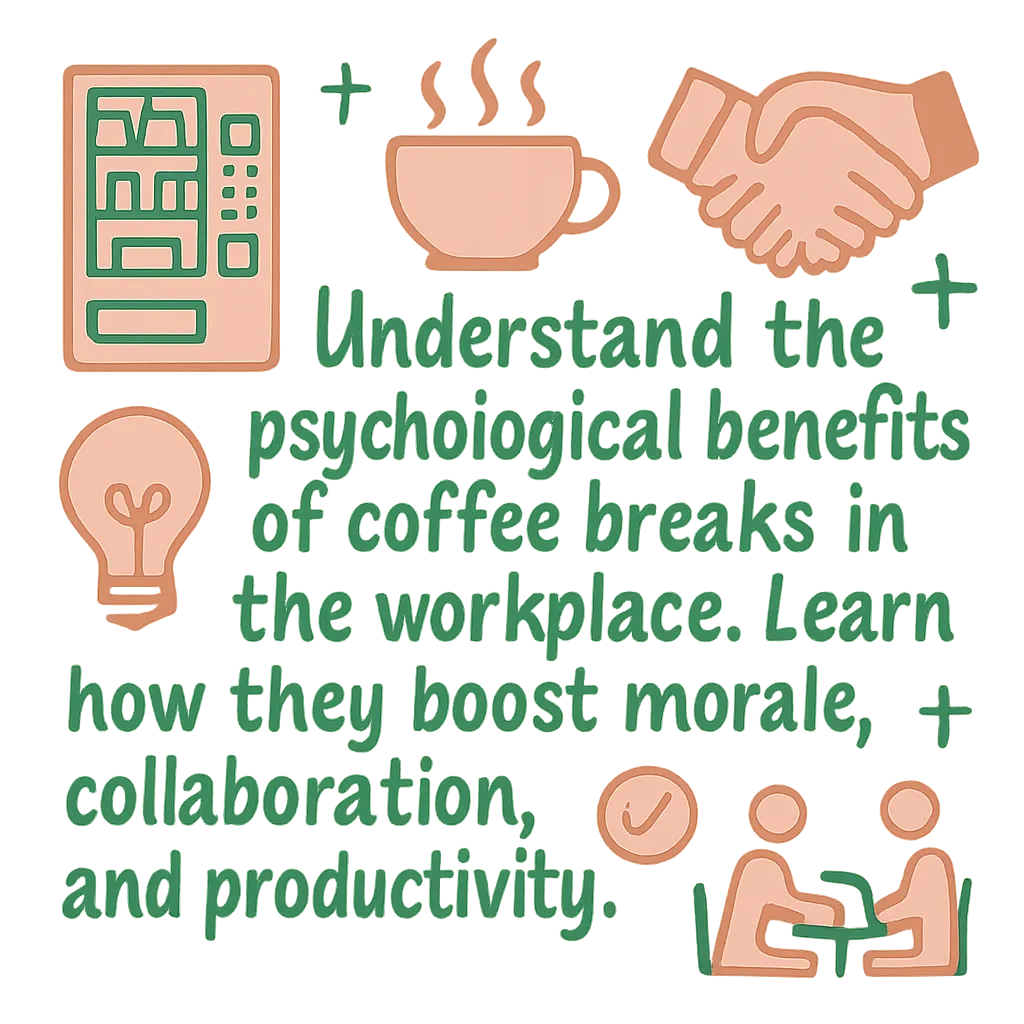The Psychology of Office Coffee Breaks
Understand the psychological benefits of coffee breaks in the workplace. Learning how they boost morale, collaboration, and productivity.
Back to Office Coffee Services ResourcesUnderstand the psychological benefits of coffee breaks in the workplace. Learning how they boost morale, collaboration, and productivity.
Back to Office Coffee Services ResourcesBeyond just a beverage, the office coffee break is a psychological reset button. It’s a moment proven to enhance mental well-being, foster team connections, and ultimately drive greater output and satisfaction.
![]() Boosts mental clarity and reduces fatigue
Boosts mental clarity and reduces fatigue
![]() Encourages informal collaboration and idea sharing
Encourages informal collaboration and idea sharing
![]() Significantly improves overall employee morale
Significantly improves overall employee morale

In the bustling environment of a modern office, the small ritual of a coffee break often goes unexamined, yet its psychological impact is profound. It's more than just a pause for caffeine; it's a critical component of employee well-being, collaboration, and sustained productivity. Understanding the psychology behind these breaks can help businesses foster a more engaged and efficient workforce.
The human brain isn't designed for continuous, high-intensity work. Mental fatigue sets in, leading to decreased focus, increased errors, and reduced creativity. A coffee break acts as a crucial reset mechanism. Stepping away from tasks—even for a few minutes—allows the mind to disengage, process information, and return to work with renewed vigor. This brief period of detachment helps prevent burnout and keeps cognitive functions sharp throughout the day. For offices looking to implement or improve this, understanding how to choose the best office coffee service can make all the difference.
The coffee station or breakroom often serves as an informal social hub. These casual interactions between colleagues from different departments or teams are invaluable. They break down silos, build rapport, and foster a sense of community that scheduled meetings simply cannot replicate. Studies show that a strong social network at work contributes to higher job satisfaction and improved teamwork. Ideas are often exchanged, and collaborative solutions can emerge organically from these relaxed discussions. Check out why HR managers prioritize office vending for more insights into boosting employee satisfaction.
Beyond the social aspect, the physiological effects of caffeine play a key psychological role. A warm cup of coffee signals comfort and a brief escape. The caffeine itself is a mild stimulant, enhancing alertness, improving mood, and temporarily sharpening cognitive performance. This combination of physical comfort and mental lift makes the coffee break a powerful psychological tool for managing stress and maintaining focus, especially during demanding periods of the workday. Consider how options like coffee machines with milk frothers can elevate the experience.
Paradoxically, stepping away from a problem can often lead to its solution. When the conscious mind is engaged in light activity or social interaction, the subconscious mind has space to work. Many "aha!" moments happen during breaks, as the brain connects disparate ideas in a relaxed state. This makes coffee breaks not just about resting, but also about active, unfocused thought that fuels innovation. By valuing and encouraging these breaks, companies invest in a more psychologically healthy, collaborative, and ultimately more productive environment.
Coffee breaks offer a vital opportunity for employees to de-stress, re-energize, and briefly escape work pressures, which significantly boosts their overall mood and job satisfaction.
They create informal channels for communication and social bonding between colleagues, fostering a sense of community and reducing feelings of isolation, leading to better team cohesion.
Yes, short, regular breaks help prevent mental fatigue and improve focus. Stepping away from tasks for a few minutes allows the brain to reset, returning to work with renewed concentration.
Caffeine is a stimulant that enhances alertness and cognitive function. During a break, it provides a gentle boost, helping workers feel more awake and ready to tackle tasks post-break.
Micro-breaks (5-10 minutes) can be highly effective. They prevent excessive distraction and maintain momentum while still offering enough time for a quick mental reset and a coffee.
Informal chats during coffee breaks can lead to spontaneous brainstorming and new perspectives, enhancing creative problem-solving by allowing ideas to flow freely in a relaxed setting.
Typically, 15-20 minutes is considered optimal. This length is sufficient for grabbing a drink, having a brief chat, and resetting mentally without disrupting workflow too much.
Providing inviting breakroom spaces, high-quality coffee options, and clear communication about the importance of taking breaks can encourage employees to utilize them effectively.
Absolutely. Stepping away from difficult tasks, engaging in light conversation, and consuming a warm beverage can significantly lower stress levels, improving emotional regulation.
A reliable, high-quality office coffee service that offers variety and convenience is key. Freshly brewed coffee and a selection of teas contribute to a pleasant and anticipated break experience.